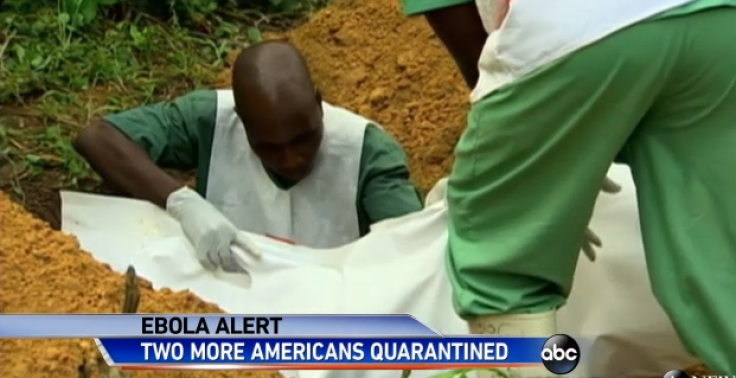Peace Corps Withdraw 340 Volunteers From Ebola Outbreak Infected Areas; Should We Be Worried?

In the latest news regarding the current West African Ebola outbreak, the Peace Corps has announced it will be withdrawing hundreds of volunteers currently working in Guinea, Liberia, and Sierra Leone. This comes after two volunteers were exposed to an Ebola patient. Reports say the volunteers are not symptomatic, but still, should we be worried?
Evacuation
The two Peace Corps volunteers who had come in contact with an individual that later died of Ebola have now been placed in quarantine, ABC News reported. They will now be on a fever watch, following CDC protocol for anyone at risk of contracting the virus. When the volunteers receive medical clearance, they too, like the other 340 evacuated volunteers, will be sent back to America. For now, the Peace Corps has said it will be “closely monitoring the current outbreak,” and “working with leading experts from the CDC and U.S. Department of State.”
The Peace Corps is not the only organization to evacuate volunteers. Two Christian charity organizations, SIM and Samaritan’s Purse, have also announced that they were evacuating nonessential personnel due to “instability and ongoing security issues in the area,” The Wall Street Journal reported. This is a growing crisis of proportions that will cost, we think, thousands of lives and maybe more," said Bruce Johnson, president of SIM USA.
Should We Be Worried?
The Ebola outbreak is frightening. The virus has a mortality rate of about 60 percent. There is no cure or vaccination, and the world is currently facing the largest outbreak of the virus in recorded history. But how worried should we be? Art Reingold, the head of epidemiology at UC Berkeley’s School of Public Health told Vox that “more people die of diarrhea in a day than Ebola has killed in history.” Reingold went on to explain that people living in countries outside West Africa should not be concerned about the spread of Ebola because “it’s transmitted entirely through exposure to bodily fluids.”
A major factor, which is making the outbreak so difficult to contain, is the poor health care systems available in the infected countries. Reingold ensured that most high-income countries, such as those in Europe or the U.S., are fully equipped with preventing the transmission of Ebola. These countries would be better equipped at “making sure suspected patients are treated and isolated and appropriate measures are taken for the health care workers taking care of them.” As for getting on an airplane and even going to the affected countries for work, Reingold insists that he “would have no fear or concern.”
Even doctors and health care workers currently stationed in outbreak hotspots report feelings of optimism, according to the World Health Organization. “On the first days I was seeing bodies being taken away; on my fourth day, I saw the first patient discharged. It was my greatest moment so far,” explained Maurico Ferri, a Brazilian intensive care specialist working in Kenema, one of the most affected areas in Sierra Leone.
International Collaboration
The CDC reported that as of July 27 the total number of deaths from the Ebola outbreak was 729. Still, the World Health Organization does not advise any travel restrictions on Liberia, Sierra Leone, Nigeria, or Guinea, “based on the current information available for this event.”
Discussions continue to be held with “donor community, development partners as well as international agencies at a global level,” to address the need to rapidly deploy additional human and financial resources to help stop the Ebola outbreak, a recent WHO update reported. Organizations currently involved in the effort are the WHO, CDC, MSF, UNICEF, IFRC, Institute Pasteur of Dakar, Save The Children, Plan Guinea, and the Sub-regional Ebola Outbreak Coordination Center (SEOCC) in Conakry, Guinea, in charge of leading this international effort. Efforts are being made to increase and strengthen the health sector response in all four infected countries.
ABC News


























